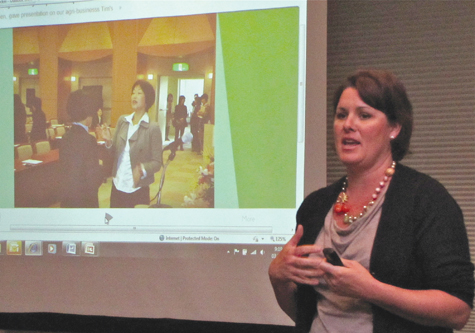Conference brings together female farmers

Just two years after a New York chapter of the female farmers’ group American Agri-Women was founded, and just one year after the organization’s Suffolk County chapter formed, New York Agri-Women are connecting with female farmers around the world.
The New York chapter held its annual meeting last weekend at the Hyatt Place on East Main Street in Riverhead, where attendees compared notes on innovations and the challenges female farmers face worldwide.
Agri-Women members have formed an exchange with Japan’s Women Empowerment and Life Improvement Association (WELI), whose leaders, Hitomi Tomizawa and Kano Kazuko, shared their successes with the New York female farmers Saturday morning.
New York Agri-Women has also formed a relationship with the United Nations Commission on the Status of Women, through which female farmers worldwide learn from each other’s work.
Ms. Kazuko said that more than half of Japan’s farmers are now women.
“It’s the highest ratio in any developed nation,” she said. Ms. Kazuko said that in the 1960s Japanese farmers grew primarily commodity crops, including rice, but are now producing a much more varied range of food crops.
There’s also been an uptick in “road stations,” the Japanese equivalent of farm stands, which sell local produce. Seventy percent of the workers at road stations are women, she said.
Ms. Tomizawa said the Japanese government has encouraged the local food movement by helping to set up “satellite restaurants,” which serve only food grown within the same region.
Erica Leubner, a pumpkin farmer from upstate New York, visited Tokyo last year to learn more about WELI’s work and visited some of the satellite restaurants.
“Whenever the government here gets involved, we don’t want that. It’s Big Brother,” Ms. Leubner said. “But imagine going into restaurants in New York City if everything was from a farm in New York.”
Another New York Agri-Women member, Sheila Marshman of Morrisville, has been working with the United Nations.
“Empowered women will feed the growing population,” she said. In developing Asian and African countries, women are responsible for sowing, growing, harvesting and preparing all the food their families eat, she added. They often work with no financial remuneration.
Ms. Marshman said many of the women she spoke with at the U.N. had the misconception that all farms in the United States have vast acreage with commodity crops planted using genetically modified seeds and employ chemical fertilizers and pesticides.
“In New York, farms are small,” she said. “Small farms keep money in rural communities, and a rural community driven by agriculture is prosperous.”
The Suffolk County chapter of Agri-Women, which was launched last April with a celebration at Laurel Lake Vineyards in Laurel, has had a good first year, according to attorney Vicki Gruber, who serves as the chapter chairwoman.
The chapter has grown to about 50 members, she said, and has met quarterly at North Fork farms including Schmitt Farms in Riverhead, Shinn Estate Vineyards in Mattituck and Sannino Vineyards in Peconic as well as Laurel Lake Vineyards.
“The Suffolk County group has done a phenomenal job,” said New York State Agri-Women chairwoman Cari Rinker. “They’re a role model. They’ve done an amazing amount of work.”







